
Time to Speak Russian__Grammar Notes
.pdf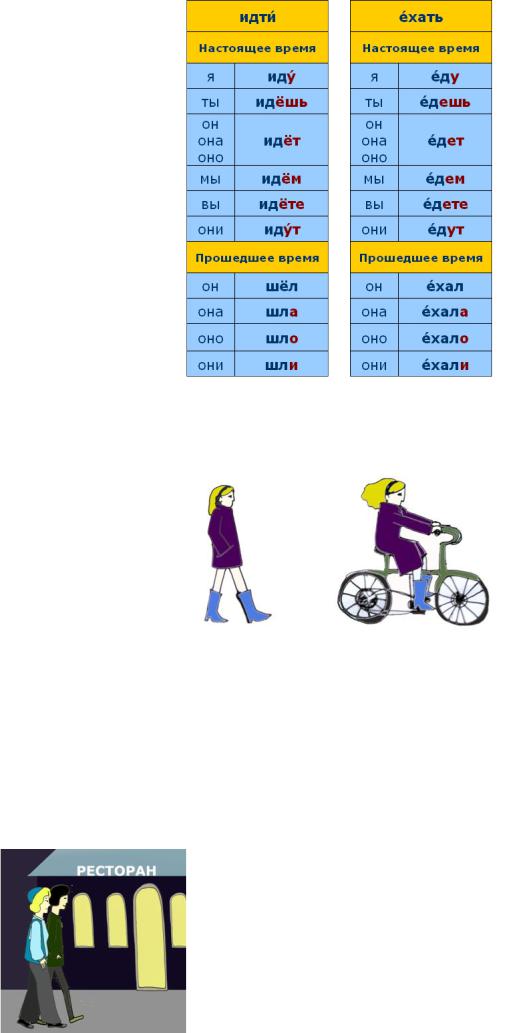
20.06.2015 |
Time to Speak Russian::Grammar Notes |
The verbs "ИДТИ" and "ЕХАТЬ" are used when:
Motion happens at a specific moment of time:
Она идёт сейчас в кино. Она едет на машине или на велосипеде?
Вчера в пять часов мы ехали домой.
В пятницу утром мы шли на стадион.
Motion is directed towards a certain goal:
идти на работу ехать в театр
Чтобы обозначить цель, по направлению к которой совершается движение, нужно использоватьДисксуществителReplicaьное в
(4) с предлогом в или на:
Вы вечером идёте в театр или в ресторан? – Куда вы идёте?
http://www.speakrussian.cie.ru/time_new/eng/grammar/ |
31/59 |
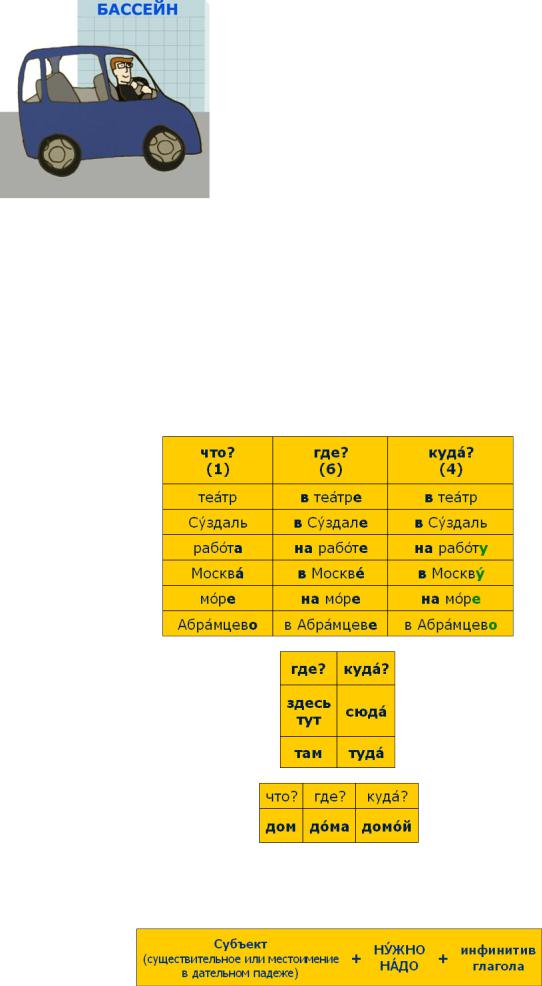
20.06.2015 |
Time to Speak Russian::Grammar Notes |
|
Игорь едет на работу или в бассейн? Куда он едет? |
Она едет отдыхать в Италию летом. – Куда она едет?
Они сейчас идут на работу. – Куда они сейчас едут?
Sometimes to indicate the motion goal, the verb "идти/ехать" will be followed by a verb infinitive (do something)
Мы идём домой.
ехать отдыхать
It is also possible to use the adverbs "туда́", "сюда́", "домо́й":
Иди сюда!
Мы идём домой.
Please, note that different cases and sets of adverbs are used to indicate location vs motion direction!
Expressing a wish or need to have a certain object: construction with the word "ну needed)
1. As you know, in Russian when we want to say that it’s necessary "to perform an action", we normally use the following co
Мне нужно работать. Ивану надо идти сегодня в поликлинику.
http://www.speakrussian.cie.ru/time_new/eng/grammar/ |
32/59 |
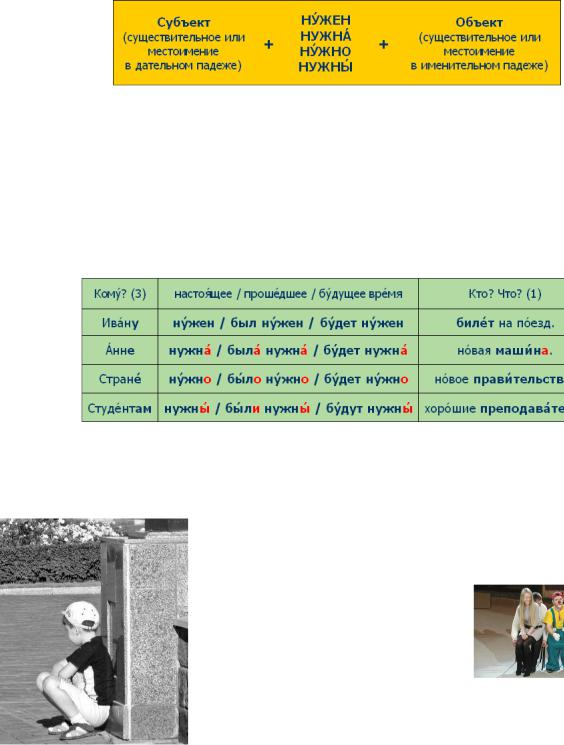
20.06.2015 Time to Speak Russian::Grammar Notes
Марте нужно было вчера прочитать статью
Студентам надо будет рассказать о себе на экзамене.
Please, note! The words "надо. нужно" are adverbs, they never change!
When we want to say that somebody needs to have something, we use another construction:
Мне нужна эта книга. Мне нужен директор.
Нам нужно испанское посольство.
Вам нужны новые учебники.
Attention! The short form of the adjective (нужен, нужна…) changes according to the gender and number of the noun deno
машина – нужна билет нужен объяснение нужно деньги – нужны.
Expressiong a person's state
To describe a physical or mental state of a person, we use an impersonal construction “verb + adverb”. The noun or pronoun this or that state or mood, changes to the Dative case.
Мальчику грустно одному. Друзьям в цирке вес
Людям было жарко. |
Ему было холодно. |
http://www.speakrussian.cie.ru/time_new/eng/grammar/ |
33/59 |
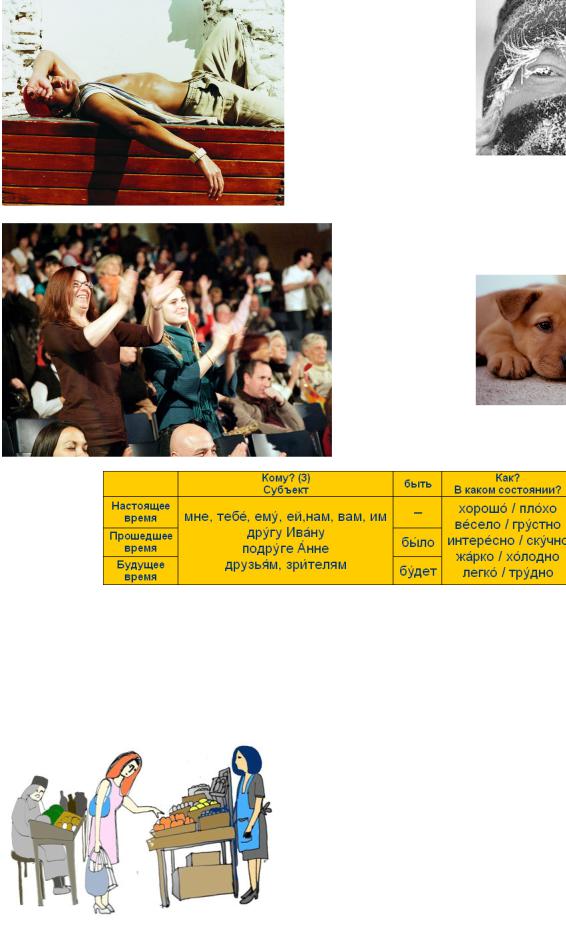
20.06.2015 |
Time to Speak Russian::Grammar Notes |
Вам будет там интересно! |
Без тебя ему будет г |
Attention! When we describe a state of a person, the verb "быть" is used in it’s zero form. In the past tense it changes to "б singular neuter) , and in the future tense it changes to "будет" (3 person singular).
Time expressions with the words «через» и «назад» («in» and
To express that an action happened some time ago in the past or will happen some time in the future, we use a grammar cons prepositions "через" and "назад". For example:
Два дня назад Мария покупала на рынке фрукты и овощи.
Через три часа у Марии дома будет вечеринка.
http://www.speakrussian.cie.ru/time_new/eng/grammar/ |
34/59 |

20.06.2015 |
Time to Speak Russian::Grammar Notes |
PLEASE, NOTE!
When we speak about the past, first, we name the time period the noun is in the Accusative (4) case and then add the word "минуту назад" (a minute ago), "два часа назад" (two hours ago), "день назад" (a day ago", "неделю назад" (a week ago ago).
When we speak about the future, we start with the word "через" (in) and then add an Accusative noun (4) to indicate the tim минуту" (in a minute), "через день" (in a day), "через месяц" (in a month), "через год" (in a year).
Invitation to action: "Давайте пойдём вместе" ("Let’s go tog
If you want to suggest that you and your friend or friends should do something together, you need to use one of the following constructions:
1. The Imperative form of the verb "давать" – "дава́й / дава́йте" + the infinitive form of the verb describing the action
Дава́й дружи́ть! Дава́йте игра́ть вме́сте!
2. Императив от глагола давать – дава́й / дава́йте – плюс форма 1 лица множественного числа глагола, обозначающе после дава́й / дава́йте используется форма глагола совершенного вида множественного числа первого лица
Давай познакомимся!
http://www.speakrussian.cie.ru/time_new/eng/grammar/ |
35/59 |
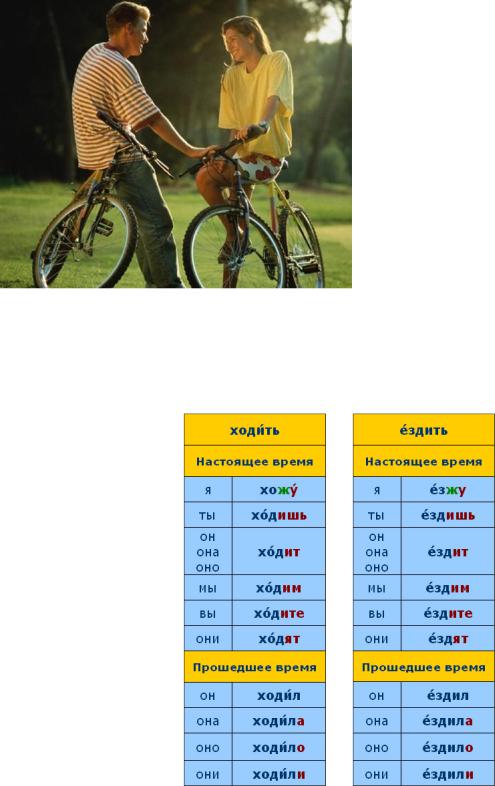
20.06.2015 |
Time to Speak Russian::Grammar Notes |
ХОДИТЬЕЗДИТЬ
In the Russian language, beside the pair of imperfective verbs of motion идти – ехать, there is another pair of verbs of motio (как идти́)on foot – ходи́ть (like идти́)или на транспорте – е́здить (как е́хать):or by transport – е́здить (like е́хать):
пешком – ходи́ть (как идти́)
или на транспорте – е́здить (как е́хать):
Which verb to select: ИДТИ́/ Е́ХАТЬ or ХОДИ́ТЬ / Е́ЗДИТЬ
The verb pair "идти́/ е́хать", as you already know, describes an action taking place at a specific moment:
A street conversation.
–Приве́т! Куда́ты сейча́с идёшь?
–Я иду́в магази́н. А ты?
–А я иду́в библиоте́ку.
Сего́дня у́тром я е́хал на рабо́ту на маши́не и до́лго стоя́л в про́бке.
За́втра ве́чером я бу́ду е́хать в по́езде и смотре́ть в окно́.
Please, note: the verbs "идти" and "ехать" are used only to describe a oneway motion, or motion in one particular directio
идти в магазин ехать на работу ехать в Москву
http://www.speakrussian.cie.ru/time_new/eng/grammar/ |
36/59 |

20.06.2015 |
Time to Speak Russian::Grammar Notes |
идти в музей
In contrast to the verbs "идти – ехать", the verbs "ходить" and "ездить" are used to describe a repetitive or regular action
Я е́зжу на ра́боту на метро́ка́ждый день. А ра́ньше я е́здил на работу́на маши́не. Ка́ждые выходны́е мы с друзья́ми хо́дим в кино́.
Ка́ждый день я ходи́л на рабо́ту пешком, когда́рабо́тал на фи́рме в Петербурге. Мы регуля́рно е́здили на метро́, когда́жи́ли в Росси́и.
The verbs "ходить" and "ездить" are also used when we describe motion in different directions:
Андре́й лю́бит путеше́ствовать и ча́сто е́здит в ра́зные стра́ны. Ната́ша лю́бит вку́сную еду́и ча́сто хо́дит в рестора́ны.
Compare:
Сейчас я еду в Петербург. Я очень люблю ездить по России.
Мы идём сейчас на выставку. В Москве мы каждую неделю ходим на выставки, в музеи или театры.
Remember!
In Russian, the construction with the verbs "ходить / ездить" in the past tense is often used similarly to the construction wit the past tense:
"Мы ходи́ли на конце́рт." (We went to a concert) = "Мы бы́ли на конце́рте". (We were at a concert)
Please, note! To indicate location, the verb "быть" is followed by the noun in the Prepositional case: "быть где?" (6) (to be работе" (to be at work), "быть в офисе" (to be in the office). But to indicate the motion direction, the verbs "ходить / ездит "идти / ехать") are followed by nouns in the Accusative case: "куда?" (4) (to go where?): "ездить в офис" (to go to the offi (to go to school).
ПОЙТИ, ПОЕХАТЬ
The verbs ПОЙТИ́and ПОЕ́ХАТЬ are derived from the verbs ИДТИ́и ЕХАТЬ́ ; the prefix ПО is added, and they become look at how "идти́/ пойти́", "е́хать / пое́хать" conjugate and compare them:
http://www.speakrussian.cie.ru/time_new/eng/grammar/ |
37/59 |
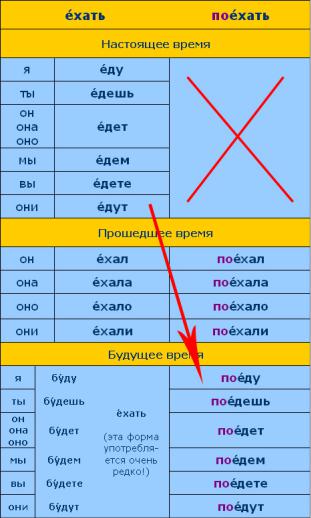
20.06.2015 |
Time to Speak Russian::Grammar Notes |
http://www.speakrussian.cie.ru/time_new/eng/grammar/ |
38/59 |
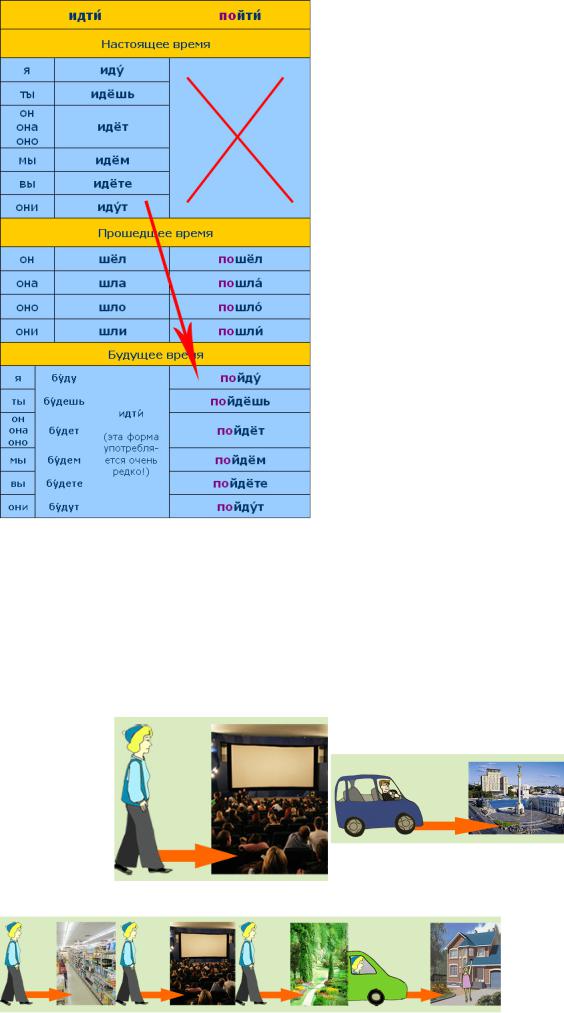
20.06.2015 |
Time to Speak Russian::Grammar Notes |
Verbs with the prefix "ПО" are used in the following cases:
1.To express a wish, intention or ability to go somewhere, we use the construction: хоте́ть, мочь + пойти / поехать:
Яхочу́пойти́в кино́.
Ямогу́пое́хать в Петербу́рг че́рез неде́лю.
Вы хоти́те пойти́на конце́рт за́втра?
Ты мо́жешь пое́хать на метро́?
2. The prefix "ПО" indicates the beginning of a motion, therefore "пойти / поехать" are used to indicate the beginning of a direction:
Она пошла в кино. |
Он поехал в Киев. |
|
́ |
́ |
́ |
To describe a succession of movements, we also use verbs with the "ПО" prefix to indicate a beginning of each successive m
http://www.speakrussian.cie.ru/time_new/eng/grammar/ |
39/59 |
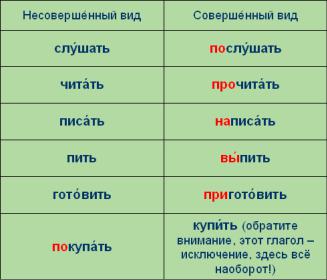
20.06.2015 |
Time to Speak Russian::Grammar Notes |
Вчера́я снача́ла пошла́в магази́н, пото́м пошла́в кино́, пото́м пошла́в парк, пото́м пое́хала к подру́ге.
–Каки́е у тебя́пла́ны на за́втра?
–У́тром в пое́ду на ры́нок, пото́м пое́ду магази́н, пото́м пойду́в бассе́йн, а ве́чером пойду́с дру́гом в рестора́н.
Please, note! To denote one and the same event that took place before, is taking place now or will take place in the future, in three different verbs of motion are used:
Вчера́А́нна ходи́ла в кино́. = А́нна была́в кино́.
А́нна идёт в кино́сейча́с. = А́нна сейча́с на пути́в кино́.
А́нна пойдёт в кино́за́втра.
Давай пойдём! Давай поедем!
If you want to suggest to your friend(s) that you do something together, you can use the construction with "дава́й" (singular)
Дава́й пое́дем на метро́! Дава́йте пое́дем на метро!
Давай ку́пим биле́ты на э́тот конце́рт! Дава́йте ку́пим биле́ты на э́тот конце́рт!
RUSSIAN VERBAL ASPECTS EXPLAINED
Perhaps, you have already noticed that when we describe an action in Russian, we use very similar but still different verbs. T and the same action, they have one and the same lexical meaning but they are still different. For example:
Я писал письмо. Я написал письмо.
Вы начинали смотреть фильм? Вы начали смотреть фильм? Друзья пили пиво. Друзья выпили пиво.
What is the difference between these verbs? These verbs represent different aspects. Most Russian verbs take on two forms an imperfective form (however, there are some verbs that are exceptions to the rule).
Now that you know that there are perfective and imperfective verbs in Russian, we should answer two most important quest
1.What are the formal markers that indicate a verbal aspect? In other words, how can we determine whether this is a pe verb?
2.When should you use one verbal aspect and when you should use the other? What are the rules that regulate the use of
RUSSIAN ASPECT FORMS
The imperfective form is considered to be the main or base verbal form. This is the form you see in a dictionary. The imperfe action as such. It serves as a base form from which a perfective form can be derived in several different ways:
1. By means of different prefixes.
2. By means of different suffixes.
http://www.speakrussian.cie.ru/time_new/eng/grammar/ |
40/59 |
